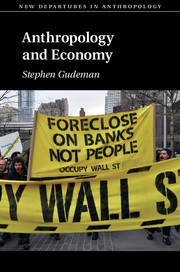3 - Mutuality and Connections
Published online by Cambridge University Press: 18 December 2015
Summary
What connects us to others in economy? Does a meeting of self-interests bring us together? Am I interested in you because you have something I desire, and are you interested in me because I have something you want? Most economists and people in the street, as well as many anthropologists, will answer that exchange rooted in self-interest draws us together. Calculated self-regard achieves cohesion by pricing goods and services in exchange.
Is self-interest the entire story of economy? What provides the structure and security for trade agreements with people whom we do not know, and if we come together only at times of self-interested exchange, why do we associate apart from these moments? Socialism tried to bypass the motive of self-interest through reliance on central planning, but in the final decades of the twentieth century it failed as measured against the successes of market economy and democracy. Economies have been based on political and military control, such as feudalism, monarchies, and dictatorships that enshrine the self-interest of those in power; however, most of these arrangements have withered compared to developed market systems. On what connections other than self-interest can economy be formed?
We have seen how vital energy provides the current of material life in parts of rural Latin America. Elsewhere local ideas and practices provide other ties for economic life. Our onlooking economist may ask, “What are these connections? Most of them, such as ‘strength,’ are not as real as self-interest.” He adds: “These connections do not make a lasting economy, which is why they disappear in modern markets.” Such connections may be fractionated and obscured in markets, but they are a part of these economies as well. The relation between self-interest and such mutual connections, however, does shift as we move our lens from house to market economies.
Fellow feeling or self-interest?
The problem of reconciling the mutuality with others that we experience and the self-interests we have was central for the French social scientist Emile Durkheim (1858–1917). It informs his most striking works, perhaps no more subtly than in his masterpiece, The Elementary Forms of the Religious Life. Durkheim found the cement of society to lie in religion and the origins of religion in sociality (which was a bit circular). His data were drawn largely from the extant information on Australian aborigines and focused on the topic of totemism.
- Type
- Chapter
- Information
- Anthropology and Economy , pp. 52 - 68Publisher: Cambridge University PressPrint publication year: 2016



